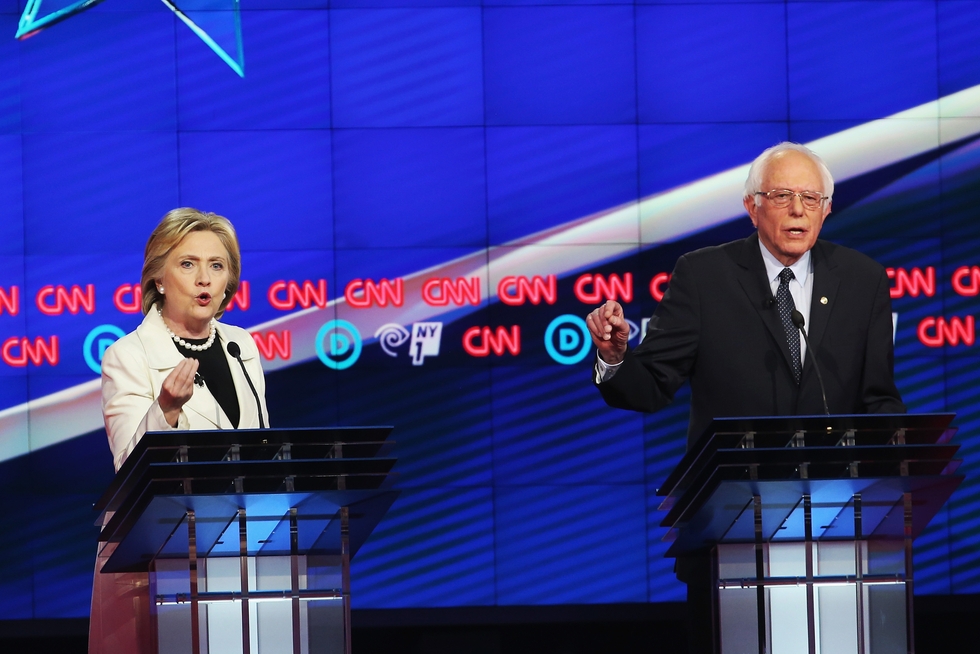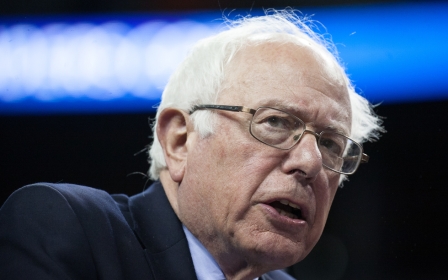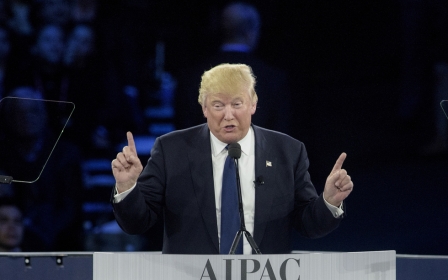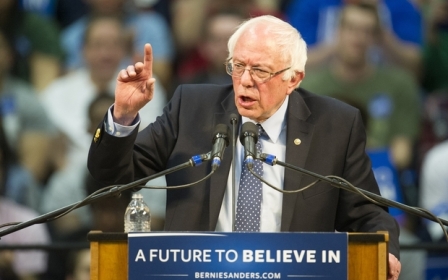Sanders and Clinton trade blows over Middle East policy at debate

NEW YORK, United States – Bernie Sanders attacked his rival for the Democratic presidential nomination, Hillary Clinton, for her policies in Iraq, Syria, Libya and Israel-Palestine on Thursday, spotlighting the Middle East in a live televised debate.
The candidates rowed over minimum wages, gun control and US foreign policy in the Middle East at the ninth Democratic presidential debate in the Brooklyn Naval Yard, in an increasingly acrimonious race for the nomination just five days before the key New York primary.
Sanders blasted Clinton, a former senator and US Secretary of State, for voting for the 2003 US-led invasion of Iraq and spearheading its 2011 bombing campaign in Libya that helped topple its leader Colonel Muammar Gaddafi.
“We didn’t think thoroughly about what happens the day after you get rid of these dictators,” said Sanders.
“Regime change often has unintended consequences in Iraq and in Libya right now, where ISIS has a very dangerous foothold,” he added, using an acronym for the Islamic State (IS) group.
Sanders also criticised Clinton’s support for a failed bid to arm moderate Syrian units in their fight against President Bashar al-Assad’s forces and in her support for a no-fly zone over parts of the war-ravaged country.
“It will cost an enormous sum of money [and] … it runs the risk of getting us sucked into perpetual warfare in that region,” Sanders said.
Clinton defended herself, suggesting that a faster military response in Syria could have halted a spiralling conflict that has claimed some 470,000 lives, according to one estimate, and forced millions from their homes.
“Nobody stood up to Assad and removed him, and we have had a far greater disaster in Syria than we are currently dealing with right now in Libya,” she told the audience.
“And, yes, I do still support a no-fly zone because I think we need to put in safe havens for those poor Syrians who are fleeing both Assad and ISIS and have some place that they can be safe.”
On Israel and Palestine
The rivals also clashed over the decades-old conflict between Israelis and Palestinians, with Sanders accusing Clinton of letting Israel off the hook too easily when it comes to rights abuses against Arabs.
Sanders said he was “100 percent pro-Israel” but warned that “if we are ever going to bring peace to that region which has seen so much hatred and so much war, we are going to have to treat the Palestinian people with respect and dignity”.
The US would only make progress towards a peace deal if it played an “even-handed role” – which he said contrasted with the speech that Clinton delivered at the meeting of a major pro-Israel lobby in March.
Clinton defended her peace-making efforts in the decades-old conflict and said that Israel is engaged in a brutal battle with Hamas – a Gaza-based militant group that receives weapons from Iran, she said.
“I don't know how you run a country when you are under constant threat, terrorist tactics, rockets coming at you. You have a right to defend yourself,” Clinton said.
Pro-Palestinian rights groups were quick to praise the national spotlight afforded to the Israel-Palestinian issue. Rebecca Vilkomerson, executive director of Jewish Voice for Peace, a pressure group, lauded a “much-needed conversation”.
“Today showed that the movement for Palestinian rights is shifting the discourse at the highest political levels,” Vilkomerson said.
“However, there is still a long way to go before we see our political leaders take courageous steps not just to recognise the humanity of Palestinians but to take action to secure their rights.”
Clinton ahead in polls and delegates
The former secretary of state holds a 13.8-point lead over the Vermont senator in the New York polls and needs a big win in next Tuesday’s primary after losing seven of the last eight contests to her leftist rival.
The debate became so heated and acrimonious that at one point the CNN moderator interjected to say: “If you're both screaming at each other the viewers won't be able to hear either of you.”
The two candidates spent the first half of the debate at each other's throats, attacking each other over the longevity of Clinton’s support for the $15 minimum wage, her political judgement and Sanders's record on gun control.
The Brooklyn-born Sanders mocked Clinton over her ties to Wall Street and her insistence that she stood up against the behaviour of banks when she was New York senator from 2001-09.
Sanders, who calls himself a democratic socialist, must capitalise on his momentum to beat Clinton in her adopted home state to keep alive his dream of wresting the nomination from the Democratic frontrunner.
His passionate call for a political revolution has galvanised young people and he spent Wednesday addressing an enormous crowd in New York's Washington Square at an event his campaign said attracted as many as 27,000 people.
But mathematics are in Clinton's favour. The former New York senator has won a commanding 1,790 delegates compared to 1,113 for Sanders, putting her on course to scoop the 2,383 needed to secure the party’s ticket for the White House, where she last lived as first lady from 1993-2001.
It set the stage for a slew of acrimonious blows at the debate in the borough which Clinton has made her campaign headquarters. She criticised her opponent for not detailing how he would implement his sweeping promises to carry out a political revolution.
“If you go and read Senator Sanders’ long interview with the Daily News, talk about judgement and the kind of problems he had answering questions about even his core issue, breaking up the banks,” she said.
A significant haul of 247 Democratic delegates are up for grabs in the New York primary, where minorities and wealthy Democrats are likely to favour Clinton, although polls suggest that Sanders has narrowed her lead.
The state also contributes 44 super delegates, and the rules, which allow only registered Democrats to vote, are likely to favour Clinton. Sanders has performed best in primaries that are open to independent voters.
With Republican frontrunner Donald Trump potentially facing a contested nomination and Clinton a tighter national race than she would have liked, New York may play its most decisive role in decades in a presidential election.
New MEE newsletter: Jerusalem Dispatch
Sign up to get the latest insights and analysis on Israel-Palestine, alongside Turkey Unpacked and other MEE newsletters
Middle East Eye delivers independent and unrivalled coverage and analysis of the Middle East, North Africa and beyond. To learn more about republishing this content and the associated fees, please fill out this form. More about MEE can be found here.




